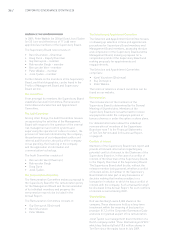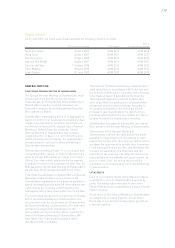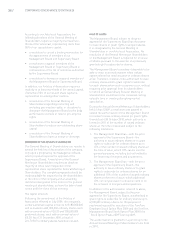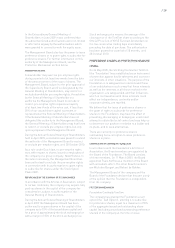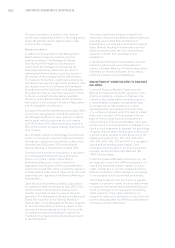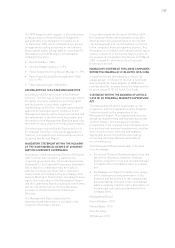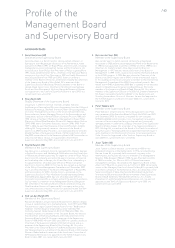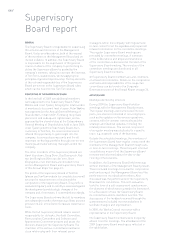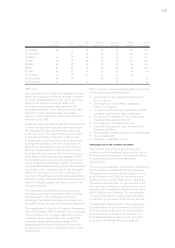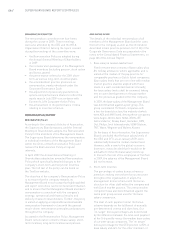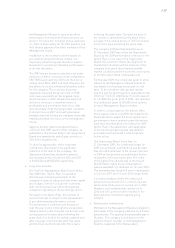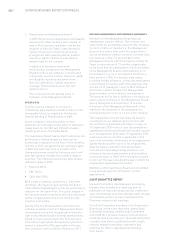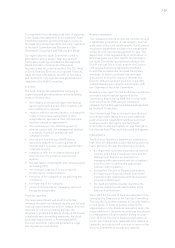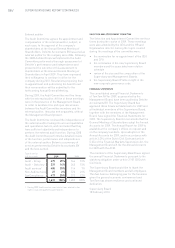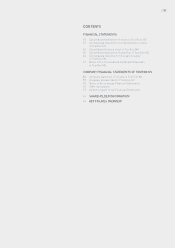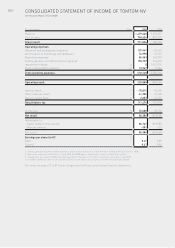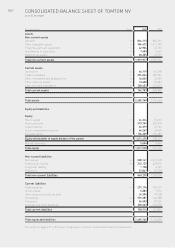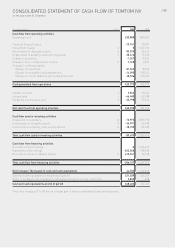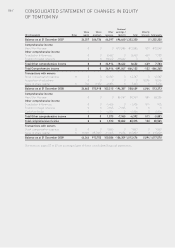TomTom 2009 Annual Report Download - page 48
Download and view the complete annual report
Please find page 48 of the 2009 TomTom annual report below. You can navigate through the pages in the report by either clicking on the pages listed below, or by using the keyword search tool below to find specific information within the annual report.46 / SUPERVISORY BOARD REPORT (CONTINUED)
REMUNERATION COMMITTEE
The remuneration committee met four times
during the course of 2009. These meetings
were also attended by the CEO and the HR &
Organisation Director. Among the topics covered
during the meetings of the committee were:
• the Remuneration Policy as adopted during
the Annual General Meeting of Shareholders
in 2009
• the remuneration packages of the Management
Board members (including pension, stock option
and bonus grants)
• the performance criteria for the 2009 short-
term as well as long-term incentive plans
• the amended best practice provisions on
remuneration, newly introduced under the
Corporate Governance Code
• the adjustment of previously granted stock
options and performance shares to reflect the
equity raise in July 2009 in accordance with
Euronext’s Liffe Corporate Action Policy
• the achievement of the performance criteria
relating to incentive schemes.
REMUNERATION REPORT
REMUNERATION POLICY
According to the company’s Articles of Association,
the Supervisory Board proposes, and the General
Meeting of Shareholders adopts, the Remuneration
Policy for the members of the Management Board.
The Supervisory Board determines the remuneration
of individual members of the Management Board
within the limits of the Remuneration Policy and
reviews the Remuneration Policy at regular
intervals.
In April 2009 the Annual General Meeting of
Shareholders adopted an amended Remuneration
Policy which specifically detailed changes to the
company’s short-term and long-term incentive
plan. The full text of the policy can be found on
the TomTom website.
The objective of the company’s Remuneration Policy
is to ensure that the company rewards its
Management Board in such a way that highly qualified
and expert executives can be recruited and retained,
and to ensure that the Management Board members’
remuneration is consistent with the company's
strategy, operational and financial results and
delivery of value to shareholders. Further, the policy
is aimed at applying a responsible and sustainable
remuneration framework in line with the general
result-driven remuneration principles and practices
throughout the company.
As stated in the Remuneration Policy, Management
Board remuneration consists of base salary, short-
term incentive, long-term incentive and pension.
APPLICATION IN 2009
The details of the individual remuneration of all
members of the Management Board and the costs
thereof to the company as well as the information
described in best practice provision II.2.13 (d) of the
Corporate Governance Code are presented in the
notes to the Consolidated Financial Statements, on
page 68 of this Annual Report.
1. Base salary at median market level
Fixed remuneration consists of base salary plus
8% holiday allowance, where applicable, and is
aimed at the median of the pay practice for
comparable positions in Dutch listed companies.
Base salary levels that are not in line with median
market practice shall be aligned with these
levels in a well-considered manner. Annually,
the base salary levels shall be reviewed, taking
into account developments in the pay market
and the job size as graded within the company.
In 2009, the base salary of the Management Board
was benchmarked against a peer group. This
group consisted of 112 Dutch companies with
a two-tier board structure, the majority of which
were AEX and AMX listed. Among these companies
were Aegon, Ahold, Akzo Nobel, ASML, BE
Semiconductor, Draka, Exact, Heineken, KPN,
Océ, Philips, Smit Internationale, SBM Offshore,
TNT, Wavin, Wegener and Wolters Kluwer.
On the basis of this information, the Supervisory
Board concluded that the base salary levels of
the CEO and CFO, as at January 2009, were
substantially below the median market level.
However, with a view to the global economic
downturn, it was decided that it would not be
advisable to move the base salary levels up.
In line with the rest of the employees of TomTom
in 2009, the salaries of the Management Board
did not increase.
2. Short-term incentive
The percentage-of-salary bonus scheme is
aimed at creating one uniform bonus structure
throughout the organisation. It aligns the
management bonus scheme with the bonus
structure for other staff within the company and
with Dutch market practice. This remuneration
component was also benchmarked against the
same peer group as was used for the base
salary comparison.
The level of cash payment under the bonus
scheme depends on the fulfilment of annually
pre-determined criteria and objectives. Our
‘on-target’ bonus percentages are determined
by the difference between the total cash payment
at the 3rd quartile minus the median base salary
of our peer group companies. The ‘on target’
bonus percentage for the CEO position is 80% of
base salary and 64% for the other members of


